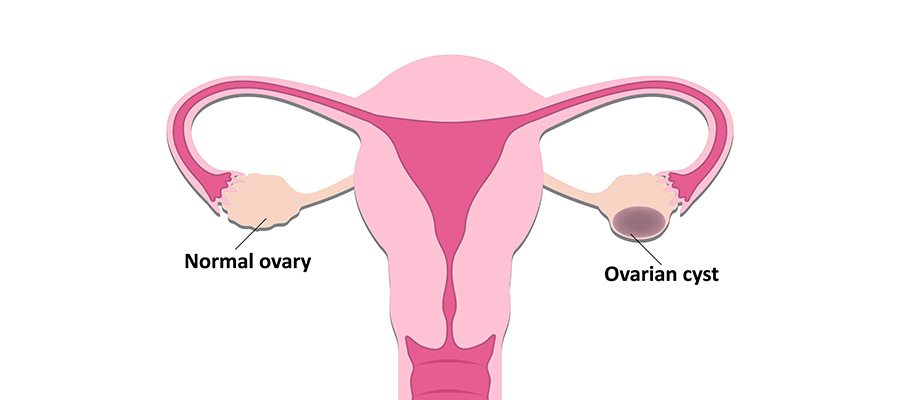


Ovaries are a woman’s reproductive organs that make female hormones and release an egg from a follicle (a small fluid-filled sac) each month. The follicle is usually about 2–3 cm when measured across (diameter) but sometimes can be larger.
An ovarian cyst is a larger fluid-filled sac (more than 3 cm in diameter) that develops on or in an ovary. A cyst can vary in size from a few centimetres to the size of a large melon. Ovarian cysts may be thin-walled and only contain fluid (known as a simple cyst) or they may be more complex, containing thick fluid, blood or solid areas.
There are many different types of ovarian cyst that occur before the menopause, examples of which include:
Other types of cyst on the ovary are less common. Almost all ovarian cysts that occur before the menopause are benign. Cancer of the ovary before the menopause is rare.
Ovarian cysts are common. Most women will be unaware that they have a cyst as they often cause no symptoms and disappear spontaneously with time. However, up to 1 in 10 women may need surgery for an ovarian cyst at some point in their lives.
Most cysts are diagnosed by chance, for example during a routine examination, or if you have an ultrasound scan for another reason. Therefore, you may have no symptoms at all. However, you may experience one or more of the following:
You will normally be asked questions about your general health, your periods, whether you have any pain in your lower abdomen, your sex life and any contraception that you may be using. You may also be asked if there is a family history of ovarian or breast cancer.
You will usually have an examination of your abdomen as well as an internal (vaginal) examination.
You should be offered an ultrasound scan to look at your ovaries. This is likely to include an abdominal scan and one through your vagina. In the majority of cases, the ultrasound scan will be normal and a cyst on the ovary will not be a cause of your symptoms.
If you do appear to have a cyst, the sonographer will check whether it is in your ovary. One in 10 suspected ovarian cysts actually involve other nearby structures, such as the fallopian tube or bowel. The scan will check the size and appearance of the cyst and look at your other ovary.
If your scan suggests that you have a complex cyst, you might be offered blood tests, which can help to determine what type of cyst it is. You do not need blood tests if a simple cyst is diagnosed.
If you have symptoms or if the ultrasound has shown a large or a complex cyst, you are likely to be referred to the hospital. In the unlikely event that the tests suggest the possibility of cancer, you will be referred to a gynaecological cancer specialist for further investigation.
If your scan is reassuring and you have no symptoms, you may not need any treatment. Treatment options include ‘watching and waiting’ or an operation to remove the cyst if it is getting bigger or is complex. Your choice depends on your symptoms, the appearance and the size, and the results of any blood tests. You should be given information about the choices in your individual situation, including information about the risks and benefits of each option.
You will usually be offered laparoscopic (keyhole) surgery, which is less painful afterwards than a laparotomy (open surgery) and usually means that you can leave hospital earlier and will recover more quickly. A laparotomy (open surgery) may be recommended if the cyst is very large or, rarely, if there is a suspicion of cancer. Your gynaecologist should discuss these procedures with you, explaining the benefits and risks, and advise you which procedure is best for your situation.
Your ovaries are unlikely to be removed. The ovaries produce important hormones before menopause and therefore in most cases only the cyst is removed. However, there are some circumstances where the ovary may need to be removed, for example if the cyst is very large or has completely replaced the entire ovary. The ovary may also need to be removed if the cyst has twisted so much that the ovary’s blood supply has been cut off, or, rarely, if there is a suspicion that the cyst may be cancerous. Your gynaecologist should discuss the pros and cons of removing ovaries before surgery.
Simple ovarian cysts are often found on the ultrasound scan during pregnancy and most will disappear as pregnancy progresses. If the cyst is large or complex, you may be offered further scans during pregnancy and a scan after your baby is born. An operation to remove the cyst during pregnancy would only be recommended if you have pain thought to be due to the cyst, or, very rarely, if cancer is suspected.




Fill in the form below and we will get back to you as soon as we can.